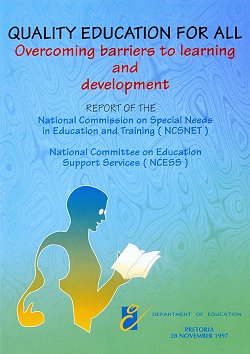Focus on policy development issues…. South Africa
“Quality education for all: overcoming barriers to learning and development”
This is the title of an exciting and radical report presented to the President of South Africa at the end of 1997. The report provides an inspiration to all those involved in policy development in education. Although the report addresses “special needs education”, it does so in the context of the education system as a whole, and not in isolation. Starting from the basis of respecting the human rights of all individuals, these policy proposals pave the way for an education system, which welcomes and responds to diversity.

Historically special needs education reflected the general inequalities of South African society, with the majority of learners receiving inadequate, or no provision. Most learners with disability either remained outside of the system or were ‘mainstreamed by default’. A small percentage of learners with disabilities were educated in ‘special’ schools and classes. The curriculum and education system as a whole failed to respond to the diverse needs of the learner population, resulting in massive numbers of drop-outs, push-outs, and failures.
The National Commission on Special Needs in Education and Training (NCSNET) and the National Committee for Education Support Services (NCESS) were appointed by the Minister and Department of Education to investigate and make recommendations on all aspects of ‘special needs and support services’ in education and training in South Africa. This included early childhood development, higher education and adult education.
The central challenge facing education was seen as follows: to recognise and address the diverse needs of the entire learner population, in order to promote effective learning for all. Barriers to learning and development include: barriers within the curriculum, the centre of learning, the education system, or broader social context and barriers experienced as a result of learners’ needs. The central role of support services is to minimise, remove and prevent these barriers, and to develop enabling mechanisms to ensure that the curriculum becomes responsive to the needs of all learners. The development of inclusive and supportive centres of learning should enable all learners to participate actively in the education process so that they can develop and extend their potential and participate as equal members of society. Some of the key characteristics of the education system envisaged include:
- Every centre of learning would have centre-of-learning-based support structures which would predominantly comprise of teachers, but which would draw on community resources and specialist services. Support would therefore be primarily community-based in nature;
- Every district would have a support centre, where centres of learning would be able to access specialist and other support services. These services would consist mainly of training and support for teachers. Support for individual learners would be provided only in exceptional cases;
- Parents, teachers and learners, or their advocates, would be involved in managing centres of learning, in the planning of curriculum and support programmes, and in the teaching and learning process. Relevant community resources would also be involved;
- The system would be sustainable in terms of financial resourcing and in terms of leadership and management capacity.
Free copies of this report are available from:
The Director General . Department of Education . Private Bag X895 . Pretoria . South Africa